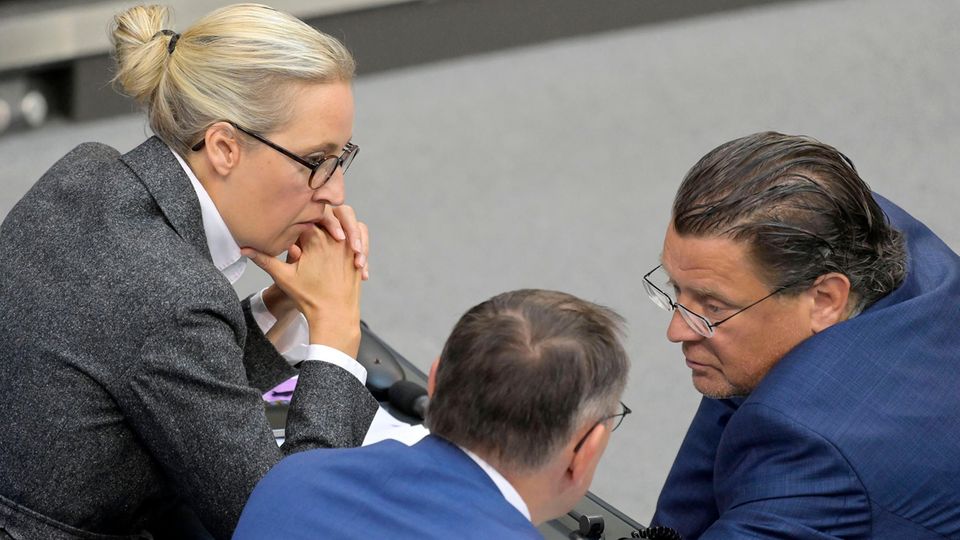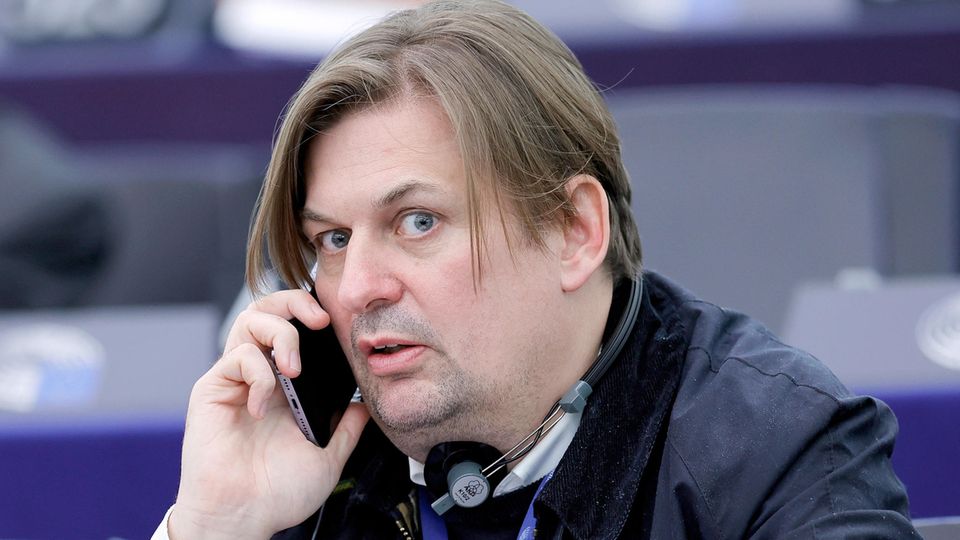The French Rassemblement National has terminated its cooperation with the AfD. The reason is, who else, Maximilian Krah. But the reasons go deeper.
The German-French friendship between the AfD and the right-wing nationalists Rassemblement National (RN) has been suffering for a long time. Now it seems to be broken for the time being.
The RN has decided that it no longer wants to sit in a parliamentary group with the AfD in the European Parliament, said Jordan Bardella’s election campaign team. The 28-year-old is chairman of the party and its top candidate for the EU elections. He is the face of the new right-wing extremism that Marine Le Pen has been developing for years.
As French media reported, “recent statements by the AfD” led to the rift. And, once again, it was about Maximilian Krah.
What had happened again now? The AfD’s top EU candidate had once again shared his exclusive views on National Socialism. “I will never say that anyone who wore an SS uniform was automatically a criminal,” he told the Italian newspaper La Repubblica. Not all members of the NSDAP’s Schutzstaffel were criminals.
Now this omission is by no means new, but fits seamlessly into Krah’s earlier relativization exercises. Nevertheless, Le Pen and Bardella are using the breaking of the taboo to finally renounce and distance themselves from the AfD in the European election campaign.
The strategic conflict between RN and AfD
But why? At least ideologically, there are only minimal differences between the two parties. Both the Rassemblement National and the AfD represent extremely nationalist, xenophobic and authoritarian positions and are fighting together against European integration.
The conflict is therefore hardly justified in terms of content. It has primarily strategic causes, on at least three levels.
Firstly, in radical movements there is always a struggle over the question of whether the established power relations should be overcome using revolutionary methods or rather through reforms. In the AfD, former leaders such as Bernd Lucke and Jörg Meuthen stood for a more moderate approach, while the extremists around Björn Höcke propagated fundamentalist resistance. This wing, to which Krah also belongs, has established itself in the party in recent years.
Marine Le Pen, on the other hand, has long been taking the opposite approach. She broke away from her right-wing extremist and racist father, gave up the nickname “Front” and took a more moderate stance.
This has to do with the second level of justification. France is centrally organized. The presidential system and majority voting mean that a political force must first achieve political hegemony in the entire country in order to be able to really shape things.

Marine Le Pen wants to become French presenter for the Rassemblement National.
© Manon Cruz / Reuters
That’s why it was of little use to Le Pen that she won a quarter of the French EU mandates in 2014, was able to send a large faction to the National Assembly in 2022 and won more than 40 percent in the presidential election. She has to move into the Élysée Palace in order to actually rule. This is her life goal that she wants to achieve in 2027.
Different systems – different strategies
In federally governed Germany and its personalized proportional representation, the path to power is usually easier: from entry into the state parliaments through toleration or coalition and the election of prime ministers to participation in government in the federal government and finally to chancellorship. While the Left ended up in the Bundestag, the Greens went almost the entire way – and the AfD, despite its isolation, is also steadfastly pursuing this course. It wants to become so strong in the East German states in 2024 and in the federal government in 2025 that the so-called firewall will then fall stone by stone.
Le Pen’s RN, however, is in a completely different situation, especially since a third level is added: The former colonial power France is a classic immigration country, without migrants and their descendants no party can win a majority in elections here. In addition, part of French national pride is based on the history of the resistance against Hitler’s Germany – and on the demarcation from National Socialism.
That is why calls from the AfD for a “remigration” of millions of allegedly illegal refugees are toxic for Le Pen. And that is why the relativization of Nazi crimes, as Krah systematically does, is a provocation for her party.
The trouble with the RN is causing nervousness in the AfD to continue to grow. Bad news is piling up for the party before the European elections on June 9th: first the court-confirmed surveillance by the Office for the Protection of the Constitution, then the China espionage affair involving one of Krah’s employees, and also the corruption investigations against Petr, who was placed second on the EU list Bystron, the verdict against Björn Höcke and now the open dispute with the most important European partner.
Warning about “melonization” of the AfD
Although the AfD presents itself as a victim of state and media persecution in its tried and tested manner, there are individual, differentiated voices. MEP Gunnar Beck called for damage control on Wednesday. It is now “urgent” that the party draws “the necessary conclusions” in order to stop further disruption and to give the European election campaign a clear and objective direction despite the campaign against the AfD,” he said star. “I am confident that the party leadership is aware of this and the value of further cooperation.”
But even if: Just like in February, when Weidel unsuccessfully asked Le Pen for leniency in Paris, the current reaction of the AfD leadership also shows helplessness. The fact that Krah now had to resign from the Federal Executive Board and was banned from campaigning does little to change the fundamental conflict of goals between the two parties.
This is obviously how Benedikt Kaiser, author, agitator of the so-called New Right and employee of the AfD parliamentary group sees it. Le Pen may think he has to copy Italian Prime Minister Giorgia Meloni, he wrote on X (formerly Twitter). A “forced melonization” should help her become president of France.
But the result of this strategy, writes Kaiser, would be an “opportunistic pivot to the center.” In this case, the AfD should under no circumstances follow the RN: “You can immediately make the Union stronger; the result is the same.” It looks like not everyone in the AfD is sad about the break with their former friends from France.



